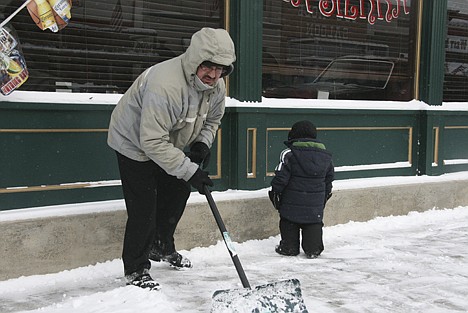Small city makes the most of grant money
Editor's note: You can't put a price tag on quality of life in any given city, but you can do some simple math and figure out about what each city spends on its residents.
The Press offers an informal but, we hope, interesting series that looks at the budgets of Kootenai County cities and determines how those budgets translate into per-resident spending.
We also offer perspectives from people who live in these communities about how much bang they believe they get for their municipal-targeted buck.
SPIRIT LAKE - One-hundred and two years old, the city of Spirit Lake is known for its scenic waterfront, snow-filled winters and historic downtown area.
Maine Street is the main drag in Spirit Lake, flanked by storefronts and cafes. Highway 41 bisects the city, splitting it almost perfectly in half. The lake itself, long and narrow with a jagged shoreline, is on the west end of town.
Spirit Lake is home to 1,750 citizens. As of September 2010 - the latest month figures were available - the Spirit Lake city budget is just over $3.6 million, according to city clerk Barbara Brown.
That works out to about $2,057 per citizen.
The budget is inflated, though, because of large grants figured into the total, Brown said. One grant from the Idaho Transportation Department, worth $750,000, will be used for an extensive improvement project on 10th Avenue, which has no sidewalks or walking paths.
"Because of the schools, this is a huge plan for the community," Brown said. "It'll take the children who are going to school off of the street and onto safe walking areas. They'll be more safe."
Highway 41 is the main route through Spirit Lake, Brown said, but if the road was ever closed to traffic, a bottleneck would occur. The 10th Avenue project will provide another thoroughfare for commuters who are just passing by.
Some preliminary engineering took place last summer, Brown added. Construction could be completed by 2012.
Another grant in the Spirit Lake budget is a $500,000 Idaho Community Development Block Grant, Brown said. If the money is granted, the city will undertake a downtown revitalization project, re-doing sidewalks, installing new water meters, improving drainage and beautifying the Maine Street area.
"It hasn't had a true facelift in probably 50 years," Brown said. "They want to redo it with new lights, benches and trash cans."
That project is a joint venture between the city and the Spirit Lake Urban Renewal Agency, a five-member committee that uses tax dollars to fund projects beneficial to the community. For example, the agency has orchestrated paving and walking path projects around town.
"I know that the urban renewal money is being spent accordingly," said city councilman Jimmy Brown, Jr. "Most of the money that comes back through taxes goes through the urban renewal."
The agency can only fund projects in certain zones, he added, usually blighted areas.
Spirit Lake has applied for the ICDB grant but hasn't yet been approved, Brown said. The money was still included in the budget, however, and the revitalization project will hopefully commence in the spring if the grant is received. The city should know by March or April of 2011, she said.
"Nothing's a done deal when you're talking about money nowadays," she added.
The non-grant portion of the Spirit Lake budget - about $2.35 million - is spent primarily on police, water, sewage and street care, Brown said. Snow removal is particularly important.
"Spirit Lake is notorious for its snow in the winter," Brown said.
The Spirit Lake police department employs five officers, including Chief of Police Patrick Lawless. A federal COPS (Community Oriented Policing Services) grant helps defray some of the police expenses - the only federal grant in the Spirit Lake budget.
There are other city expenses, too, such as administration costs and parks and recreation, Brown said.
And another large project could be on its way: Spirit Lake is facing a sewage situation, City Council member Jimmy Brown said. Were the city to grow larger, the current sewage system could not accommodate additional housing.
"We have a sewage problem," he said. "We're limited on our growth because of that fact. We've paid our city engineer to tell us what we can and cannot do (to remedy the problem)."
He said a new sewage plant is needed - an expensive project that will likely call for another grant. Planning should begin soon, Jimmy Brown said, because the City Council needs to prepare for the future.
"It is a problem that needs to be dealt with," he said. "We need to look farther up the street. I think that's our responsibility as council people."

